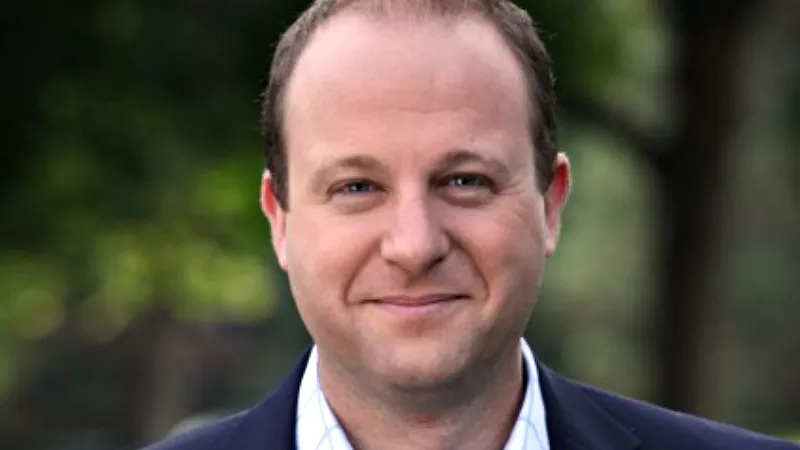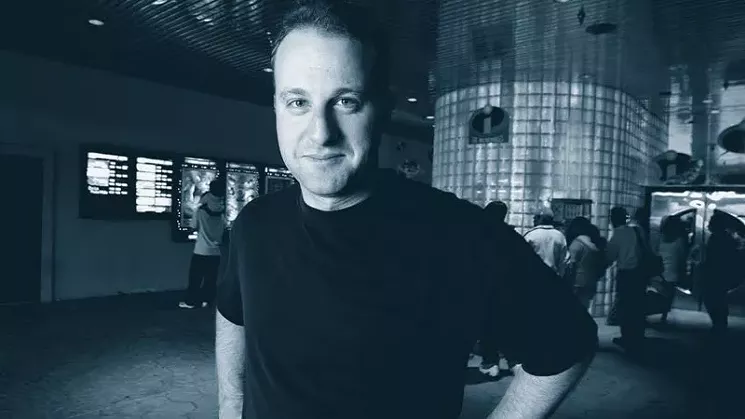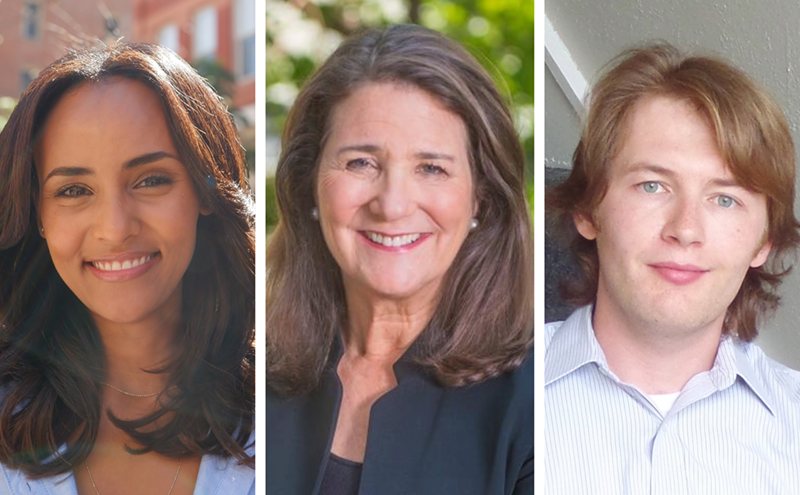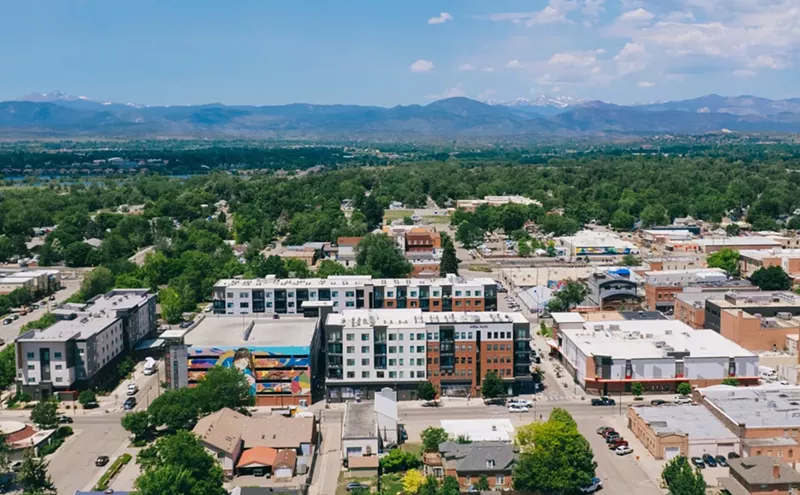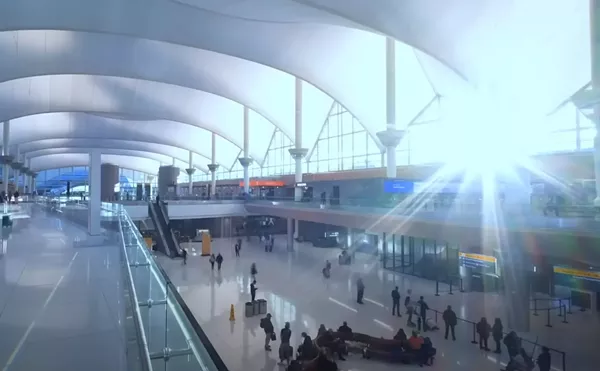The rep for Colorado's 2nd Congressional District, which includes Boulder, Polis is the sixth major gubernatorial hopeful to participate in a Westword Q&A. The first of Polis's fellow Democrats to announce was former state senator Mike Johnston, followed by ex-Colorado treasurer Cary Kennedy and Congressman Ed Perlmutter. On the Republican side are 18th Judicial District DA George Brauchler and businessman (and nephew of Mitt Romney) Doug Robinson.
Polis is currently considered to be the fifth-richest member of Congress, for reasons we detailed in "Young Blood," published in August 2004; at the time, Polis was 29 and chaired Colorado's State Board of Education. Just six years earlier, in 1998, he sold American Information Systems — an Internet service company he started in his dorm room at Princeton University, where he majored in political science — for over $22 million in cash, a deal that looked even better after the tech bubble burst. The 1999 sale of Bluemountain.com, a greeting-card business he guided in conjunction with his parents, Stephen Schutz and Susan Polis Schutz, proved to be awfully lucrative, too, topping out at over $900 million. Polis took home $150 million personally.
In 2008, after spending six years on the state board, Polis was elected to succeed Mark Udall as the 2nd Congressional District standard-bearer. He's since earned a reputation as one of the House's most progressive voices on a variety of issues, including marijuana.
We chatted with Polis on June 16, the morning after the annual congressional baseball game, which took place against the backdrop of an attack on Republicans practicing for the game two days earlier; Representative Steve Scalise is still recovering from his injuries. Polis was the offensive star for the Democrats, driving in four runs to help lead to an 11-2 victory.
During the portion of the chat that didn't relate to baseball, Polis proved that he knows how to stay on message — and the adjective of choice was "bold," which he used ten separate times to talk about his assorted plans. Along the way, he also addressed the question of whether he's anti-fracking and makes it clear that he'll be among the most significant donors to his own campaign.
Here's the conversation.
Westword: You've been a prominent member during your time in the House, and you sit on some very significant committees — and there's the perception that you could be reelected in your district for many years, if not decades, to come. So why are you choosing to give up your seat to run for governor?
Jared Polis: I think there's an enormous opportunity to turn bold ideas into results at the state level on issues that really make a difference for our country and for families. If you look at something like climate, with President Trump pulling out of the Paris Accords, all the progress on climate and clean air is getting made at the state level. And I have a bold plan to move our state to 100 percent renewable energy by 2040 and create clean-energy jobs that can never be outsourced. And if you look at the other issues that I've spent a lot of my career on, which are education and providing opportunity for families, again, we're not going to see anything positive coming out of Washington. The only thing we're going to see is funding cuts. But at the state level, it's really time to stop talking about investing in kids and time to build a winning coalition to actually do it.
Your comments suggest a level of frustration about how Congress functions as an institution. Do you feel it's difficult to make an impact as a member of a minority party when cooperation across party lines seems to be getting more and more rare?
I've been honored to work effectively across the aisle on bills like the Email Privacy Act, which passed the House unanimously earlier this year, or the Lake Hill land exchange, that is allowing Summit County to build affordable workforce housing. But I think what I've been able to demonstrate in my near-decade of representing Colorado is that I'm able to use the political process to get things done. Combined with my bold vision for the state and my business experience and my hands-on experience rolling up my sleeves and starting several schools, and serving on the state school board as a statewide elected official, I think I have the full skill set to not only have a bold vision for our state, but to transform it into reality.
Has the election of Donald Trump made the atmosphere in the House even more toxic?
I think all the questions surrounding Donald Trump, and certainly his ongoing childish behavior, continue to cast a shadow on our work. Privately, many Republicans share those concerns — even some publicly, of course, which is harder with a president from your own party. But it is disappointing to see not only the radical right-wing agenda to throw people off of health care and privatize public education, but also this year, the incompetence that we've seen, and the bungling and coverups of ongoing investigations that I feel are important to give a full accounting to the American people.
When I interviewed you for a feature article back in 2004, I asked you about the future, and you said you weren't the kind of person who had a twenty-year plan, but you could see yourself potentially starting a new business or starting a nonprofit — but you also said you could see yourself serving as the governor of Colorado. Is the governorship something that you've been targeting for a long time, either consciously or unconsciously?
As was expressed at that time, I'm honored to serve in any way. I just want to continue to do great things for our state and make a real difference. I've done it by starting a school that's served thousands of at-risk youths who would have gone unserved without that effort. I had an amazing six-year tenure on the state board of education and was the first Democratic chair in several decades. I've created several businesses that have created hundreds of jobs and implemented employee ownership and stock options, which is another thing that I'm trying to bring to the state to create an economy that works for everybody. So there were no specific goals in terms of a job or a position, but I'm always looking to where I can make the biggest difference in the state. And i think at this point in time, we need a governor with a bold vision to take us into the future.
Secretary Salazar's decision not to run for governor seems to have unleashed a flood of candidates in both parties. If he had chosen to run, would you possibly have stayed out of the race, or was running for governor something you were looking to do under any circumstances?
I wasn't really actively looking at it until Secretary Salazar made his decision. That's when I really started to evaluate the opportunity and came to the conclusion that now's the time that we need somebody with bold ideas and the ability to enact them into transformational policies for the state.
There are a lot of big-name candidates who have already announced, including your fellow Colorado congressman, Ed Perlmutter. What are the pros and cons of such a crowded, prominent field from your perspective?
I think it's terrific for voters. Democracy is all about having choices, and the more qualified candidates that can present their visions to voters, the better. It's obviously more difficult for a particular candidate to be in a large field and have your voice heard. The odds are more challenging for every candidate, the more there are. But I think it's very healthy for democracy. I think there's been too many times when there have been two or three candidates and voters say, "I don't like any of them. Do I pick the lesser of the evils? What do I do?" So I think on both sides of the aisle, you're probably going to be a good dozen candidates for governor, and hopefully I'll be the one that excites you and gets you to come to the polls for 100 percent renewable energy and an economy that works for everybody and free preschool and kindergarten.
Let's talk more about education. You've discussed wanting to establish all-day preschool and kindergarten in every community across the state. Why's that so important and what are the biggest challenges in actually making it happen?
Two reasons. One has to do with science and policy — and that is, those early educational years are the most important for a successful outcome for the child and closing the achievement gap. So when a child receives quality preschool, quality kindergarten, and enters first grade ready to learn, it makes an enormous difference in making sure a child is prepared for success. A second reason is, this is a real-life issue of how you pay for preschool. Does one spouse have to stay at home an extra year? For a single-parent household, do you have to sacrifice quality to find inexpensive daycare? If it's kindergarten and you can't afford to pay out of pocket for a full day, what do you do for the rest of the day after three hours of kindergarten? So this is a real-life issue for families who have to balance jobs and work, and it's also really important for children.
Colorado has long been seen as a state that underfunds its public schools. Do you agree with that? And if so, what can you do as governor to ensure that the funding levels increase?
First of all, we certainly can do more and better with what we have. I've been an advocate for innovative models in education and working to improve schools that aren't working for kids — not providing future training opportunities, career opportunities. I started a couple of charter schools to work with at-risk students, including the New America School, which works with new immigrants, and the Academy of Urban Learning, which works with homeless youth and leads to transitional housing. But, yes, we need to decide as a state if children and families should be a priority. I think that's where many voters in this state are. It's where people in this state are, and we can certainly begin by establishing preschool and kindergarten. States like Oklahoma and Georgia have full-day preschool and kindergarten. I think it's outrageous in this day and age that we don't have that as part of our public education.
Prior to getting into politics, you were an extremely successful businessman. How do you think that will translate when it comes to boosting Colorado's economy and luring businesses to the state?
Unlike many of the other candidates, I've created jobs and balanced budgets, and I know what it takes to help companies grow. And in the companies I've started, we've always used stock options, which are common in the technology industry. There are also other businesses in our state that have employee ownership as part of their models. In the craft-brewery industry, it's relatively common. I kicked off my campaign at a Save-A-Lot in Colorado Springs that's employee-owned. It's owned by the butcher, it's owned by the cashier. And as I learned from my business experience, not only is employee ownership good for aligning the incentives of workers with managers, but it makes sure that everybody can share in the success of the company, and we have an economy that works not just for executives and investors, but also for workers.
As governor, can you push forward policies that make that easier to do?
We can remove some of the regulatory barriers, cut the red tape and make it easier for companies that want to do it. I've talked to several entrepreneurs, especially in small to mid-sized companies, who say, "We looked at stock options. It would cost us $50,000 or $100,000 to implement it, and we don't have that kind of money." If we have a resource at the state level — and shared resources reduce the cost of the employee-owned model — I think there'll be many more companies that would use them to better align the success of their workers with the success and the growth of the company. Right now, Vermont is one of the leaders in employee ownership, and they have an employee ownership center that provides technical assistance to companies that are deploying various forms of employee ownership. My goal for Colorado would be for us to be the national leader in employee participation in ownership and profits within a decade.
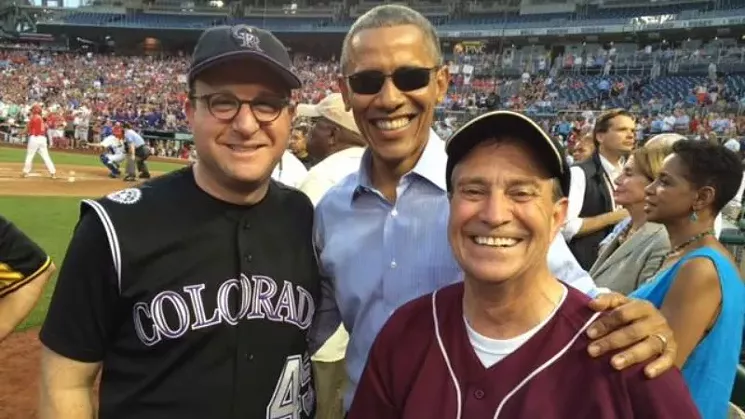
Jared Polis and fellow gubernatorial candidate Ed Perlmutter posing with President Barack Obama at the 2015 congressional baseball game.
Facebook
What good is a minimum wage that's so low people are still on food stamps and public assistance and can't even pay their rent? We need a minimum wage that allows people to live and have some discretionary income, which they then spend, and it goes back into the economy and helps businesses succeed in Colorado.
In terms of growth, there's a lot of conversation in places like Denver and Boulder about how much is too much. How do you go about striking a balance between a strong economy, but one in which urban areas aren't beset by terrible traffic congestion, overcrowding and high housing costs?
A lot of those planning decisions about growth and how it occurs are made in local communities, and the governor should in no way, shape or form be forcing decisions on those cities and counties about what they want to do in terms of their planning. But certainly, the transportation infrastructure is a statewide issue, and I've long been a supporter of expanding rail and multi-modal transit, meaning a bus- and bike-friendly transit system, and making sure we can get ahead of this growth by making sure we don't sacrifice our quality of life in the name of growth. I really want to focus on preserving what keeps Colorado special, and a big part of that is our open spaces, our parks, our quality of life.
When it comes to energy, you've got a reputation for being anti-fracking. Is it fair or unfair to make that kind of blanket statement about you?
I've always focused on keeping people safe and having the ability at the local level to make sure that our subdevelopments are safe from residential fracking and that it's done in a way that doesn't endanger the lives of Coloradans and that minimizes any damage to property values.
So this is more about local control than all fracking being bad?
Right. I've focused on empowering cities to have additional say around decision-making and where and how fracking is done, and there's going to be a very different answer, as there is in Weld County and Boulder County, about how to integrate fracking into their community. To me, that's a completely appropriate conversation to have.
Fracking is an important economic driver in many parts of the state. Do you have a plan to convince voters in those areas that you're not anti-energy and you wouldn't push policies that might reduce the number of jobs there?
I think they know that, because all of the things I've said over the years. I've always said it should be up to them, and that definitely gives them more of a say in decisions and policies around fracking. Again, you're going to have very different answers in places like Douglas County and Arapahoe County and, frankly, across the metro area. The only way to de-escalate this battle royale is to recognize that we have differences in our state, just as there might be differences in zoning around commercial developments and residential developments. It's no different for how to integrate oil and gas successfully.
You're one of the most progressive politicians in the country when it comes to marijuana policy, and one of the few in the state who didn't oppose Amendment 64. Do you think the development of the marijuana industry in Colorado over the past few years has proven that you were right — that it wasn't something to fear?
I think we can take some pride as Coloradans that we helped pave the way when it comes to a sensible, rational drug policy in our state. And in the next decade, there are going to be new challenges, and our state is up for that — particularly as new states follow suit. We want to make sure our state maintains its leadership role in the cannabis industry, and that we have more and expanded job opportunities here in the cannabis industry. We also want to make sure that we have various strategies to counter underage use of marijuana, and we want to be a leader in that, as well.
A lot of Colorado officials still keep the cannabis industry at arm's length, and the state tourism agency basically pretends that it neither exists nor brings people here. How would those things be different if you were governor?
We live now in an era where more and more states are following Coloado's lead, and we need to step up to really enact the next generation of policies that help the cannabis industry but reduce drug abuse, reduce underage use — and, of course, where possible, make sure the cannabis industry is part of our economic success, to create an economy that works for everybody.
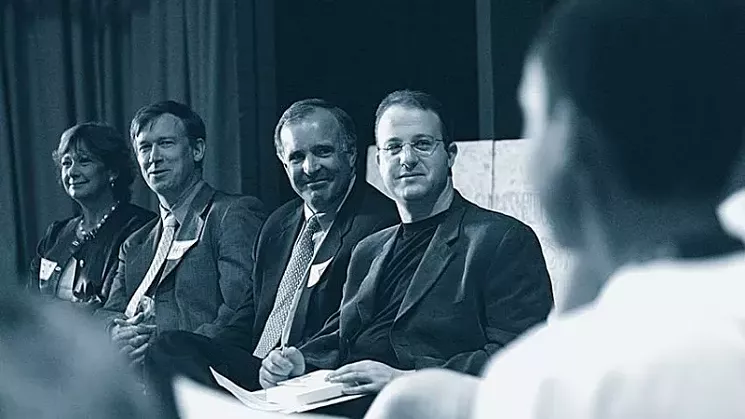
Jared Polis watching a presentation of Summerbridge, a Kent Denver program to which his foundation donated, circa 2004. Then-Denver mayor John Hickenlooper is second from left.
Photo by Anthony Camera
I'm very worried about that. I'm fighting that in Washington, as you know. It's hard to know where the Trump administration is. Jeff Sessions has been extremely hostile to even medicinal marijuana. Donald Trump, on the campaign trail, said these decisions should be left up to states, but he's yet to force his own attorney general to tone down his rhetoric or policies.
You're one of the wealthiest members of Congress. Do you plan on using your own resources over the campaign?
Absolutely. I wouldn't be able to ask others to invest in my campaign if I wasn't willing to do it myself. And we're going to limit contributions to $100, so I won't be beholden to any special interests, and I can spend the next year and a half in living rooms and apartment buildings and homes of citizens throughout the state rather than hanging out with millionaires and billionaires, trying to get them to donate money to run a campaign.
So you're more interested in meeting people face to face as opposed to trying to overwhelm your opponents on the airwaves?
It's always a question of time. Having run several campaigns, including for the state board of education and for Congress several times, candidates have to spend a disproportionate amount of time fundraising from high-dollar donors and special interests and PACs. By cutting that out of my campaign, you're going to see me in your neighborhood a lot more often. Because instead of having two or three high-dollar fundraisers a night, we're going to have two or three house parties a night, just meeting people in different neighborhoods, inviting people from the precincts to share their concerns and meet their next governor.
Some observers think you're too liberal to win a statewide race for governor, even if you win the Democratic primary. How do you respond to that theory?
I don't think it's so much about liberal versus conservative. I think it's about the future instead of the past. And I think the state is ready for a candidate with a bold vision for the future. The times demand a candidate with a bold vision for the future. That's why we're talking about investing in preschool and kindergarten for the next generation. It's why we're talking about an economy that works for everybody and making sure that workers can share in the value that's being created by economic success through stock options like we used at the companies I founded, and also a bold vision to move the state to 100 percent renewable energy and all the clean-energy jobs that can never be outsourced that creates.
Colorado is seen as a purple state, where it's important to appeal to people from a wide variety of ideological perspectives. Is that something you can do while staying true to your vision?
I've always been successful in my district. I outperformed Hillary Clinton in my congressional district. I have a strong focus on freedom and individual liberty — issues that cut across partisan lines. I've done a lot of work on food freedom, which allows people to have more say over what they consume, and reducing government red tape. I'm fiscally responsible and sponsor a balanced budget amendment in Congress, and people know that having created jobs, I have that practical experience of having policies in the state that allow businesses to grow and succeed.
During the last election, Democrats were criticized for allegedly focusing too much on urban communities, thereby making folks in rural areas feel as if they were not as important. How will you go about letting people know you want to be governor of the entire state, and not just parts of it?
I'm already the representative of towns like Kremmling and Bailey and a swath of rural Colorado, and I've done a lot of work on rural issues and look forward to continuing to push as governor on rural broadband — expanding broadband infrastructure to rural communities and making sure that all communities across Colorado are part of our future. Certainly education is a big part of that, and making sure we have an economy that works for everybody. And by everybody, I mean regardless of zip code, regardless of race, regardless of income level.
How would you sum up the reasons why you should be the governor of Colorado in 2018?
It's because I'm somebody who doesn't only have the bold ideas that can excite Colorado and lead into our future; I also have the experience to turn those ideas into results. When I talk about the goal of 100 percent renewable energy, I've also worked on those policies, both as a legislator and an advocate. We have a plan to do that on my website, polisforcolorado, and we're going to get it done. We have a specific design for a preschool and kindergarten program based on best practices in states that already have it. We make sure we'll use what works and we won't use what doesn't work — and I have the experience to make it happen here. And in terms of making sure that workers can participate in success, we've done that in the companies that I've started. There are companies in Colorado doing it every day. We're just going to make sure there are more of them doing it and that we're truly a leader in making sure employees can participate in success, in addition to employers and investors.

